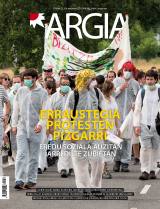Once upon a time, then today
Once upon a time there was a small neighborhood that lived on the skirts of a small town and a dry creek. For a long time, a group called the Dirughes had been sending in the world. The producers needed the people's work to make the money, and so the neighborhood was born, with the families going to the factories of the city. In exchange for the production of the products they were paid to the workers, and that salary was used to buy the products that they themselves had made, much more expensive than what it really cost to produce. That was the way that savers had to raise money. Over time, however, billionaires found a new manga: the easiest way to fill the pockets became the buying and selling of houses. If there was an overcrowded sector, it was housing. Then, the producers saw that the most profitable thing was to evict the neighborhood, in order to build new houses that would be sold at an affordable price. The neighborhood was almost deserted.
Avarice had no limits. Housing prices continued to rise. Because people didn't have money to buy houses, the money was sold to them, provided they were paying for that money while they lived. But from a moment on, many didn't have enough money to pay the debt, and the whole system that was built exploded. As a result of this explosion, the projects planned in the neighborhood were interrupted.
The cruelty of the situation was once again paid by the workers, their wages were cut, many factories closed down and others changed their places. People couldn't find a job or get a home. All the citizens were told that there was no other way, that their goal was to find work at all costs, even in exchange for misery, and then to fall back on the wheel of the witch to get the house, with a perpetual debt.
The rejection of free and self-managed spaces by many managers of public institutions is not new. And the question we should ask is: Why are these kinds of projects made so uncomfortable to them?
It was then that the neighborhood initiative was launched. They didn't believe that the only way to organize life was that marked by billionaires, and they entered the homes of the uninhabited neighborhood. They believed in collaboration and knew that, even if they were few, they could otherwise survive by helping each other. Thanks to their work, they gradually remodeled the neighborhood and made the things they needed. They showed that there was another way of doing things, more just, more focused on people's well-being and equality and not money. And they gave a new life to the abandoned neighborhood, regardless of the cruel system of the landowners. The ones that were ten at first became twenty, and then a hundred, and the project was growing and growing, and in auzolan lived happily for many years.
“And whether I had it or not… No, it wasn’t.” If we did not know the situation of the Errekaleor neighborhood and the intentions of the City Hall of Vitoria-Gasteiz, that could be a nice story to explain capitalism to the children and give a ray of hope. The rejection of free and self-managed spaces by many managers of public institutions is not new. And the question we should ask is: Why are these kinds of projects made so uncomfortable to them?
At least, as I understand the public service, public representatives should be proud that in their towns or neighbourhoods these kinds of dynamics emerge, and they should accompany them, not be enemies. Perhaps it is because, beyond speculative interests, the limits of these institutions are evident, with far fewer resources, by pure will and cooperation, because many of the projects created in them fill the gaps in the public service. Once, then, today:
Errekaleor alive!
Bidali zure iritzi artikuluak iritzia@argia.eus helbide elektronikora
ARGIAk ez du zertan bat etorri artikuluen edukiarekin. Idatzien gehienezko luzera 4.500 karakterekoa da (espazioak barne). Idazkera aldetik gutxieneko zuzentasun bat beharrezkoa da: batetik, ARGIAk ezin du hartu zuzenketa sakona egiteko lanik; bestetik, egitekotan edukia nahi gabe aldatzeko arriskua dago. ARGIAk azaleko zuzenketak edo moldaketak egingo dizkie artikuluei, behar izanez gero.
Historically, a court of the Spanish Monarchy passed the following resolution: "The officers in charge of the custody of Iratxe Sorzabal applied electrodes to force him to testify, which constitutes a flagrant violation of his fundamental human rights." In other words, after the... [+]
I have had days of visits, experiences and reflections. There I am, trying to make intersectionality a reality, trying to connect struggles, trying to say all the points as bertsolaris, without pounding...
From the community radio station LoRa where I work, we organized a round... [+]
Oliver Laxe once told me that maintaining empathy is the right thing to do in this life. That he is moved by wounded people, and that makes him very curious; and that is precisely one of the things he likes the most: to wonder why he has been moved about it, to study these... [+]
Ustekabean edo... urte hasiera honetan bi mila milioitik gorako irabaziak izan omen ditu Iberdrolak, baina ez omen dago txapliguak, altxafuegoak, etxaferuak... edo dena delakoak zeruetara botatzeko egoeran, izan ere, iaz aldi berean baino %27 gutxiago irabazi omen du. Atalen... [+]
In the debate on education, the neologism that some of us are using (I think we can call it that) is pedagogy, which perhaps needs an explanation. The idea is to give pedagogy a chance, separating the two things. As in the distinction between science and science, pedagogy would... [+]
Politikan, gizartean eragiteko nahiaren eta identitate zeinuetan sakontzearen arteko tentsioa ekidinezina da. Zabaltzearen eta norberaren ezaugarriak indartzearen arteko hartu-emana politikaren adierazle baita. Bi arloak lortu nahi izaten dira, eta elkarren artean elikatzen... [+]
Many animals use coincidence with the group as a survival strategy. This character has often been neglected, equating many collectives with herds, as a mass without its own character that must be guided. But the community, when it suspects the threat, knows how to use its... [+]
Bio etiketadun sagar edo tomate bat erosten dugunean, sagar edo tomateari osasungarri hitza lotzen diogu eta lurra zaintzen ari den nekazaria irudikatu dezakegu. Lurraren zaintzari jarritako mimoagatik, erosketaren prezio altua ulerkorra egiten zaigu. Sagarraren erosketak... [+]
Like all Mariokers, I was thirsty for references in my adolescence, in the process of admitting that I was bisexual, and I found some rare ones: Skin, singer of Skunk Anansie (among them I didn’t know she was bisexual, but the radar worked for me), Beatriz and the celestial... [+]
A fund for the State of Israel has bought most of the macrofestivals in the Spanish state. I'm talking about To. Whether it’s a festival with a beach side driveway or a festival with tattooed hardcorettes, an exchange of 1,400 million euros to build homes in Israeli colonies in... [+]
Energia politikek haserreak eta desadostasun sakonak sortu dituzte ekologisten artean. Ez da gauza berririk. Hemen eta atzerrian. Hemen eta orain, nabarmen. Duela bi urte, 2023ko udaberrian, gure ikerketa taldeak (ekopol.eus) hiru mahai-inguru antolatu zituen Donostian,... [+]
At the moment, and up to the head, a huge exhibition on Artificial Intelligence is on display at the Galerie nationale du Jeu de Paume in Paris, with the title: The world according to Artificial Intelligence. This exhibition presents a series of contemporary works of art, among... [+]
Yours is not ecology, yours is ideology.” You have the words of the head of the Spanish opposition, this time with the excuse of the blackout. What it means to distort the word ideology; energy transition and/or energy policy because, as the word says, it is pure politics. The... [+]
























